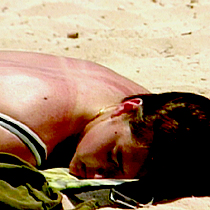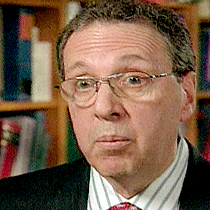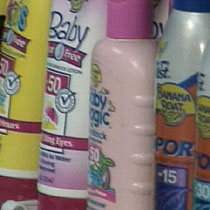2007年VOA标准英语-Study Shows Sunscreen Claims Inaccurate
搜索关注在线英语听力室公众号:tingroom,领取免费英语资料大礼包。
(单词翻译)
By Melinda SmithWashington, D.C.
09 July 2007
The World Health Organization reports there are at least 130,000 new cases every year of malignant1 melanoma, the most fatal type of skin cancer, and more than two million cases of other types of skin cancer. Because most skin cancers are traced to too much exposure to the sun, many people have begun using sunscreen creams when they go outdoors. But do those lotions2 really work? VOA's Melinda Smith reports on the results of a recent study.
 |
| A beachgoer tanning in the sun |
Shopping for sunscreen lotions to block out those rays can be confusing. One claims to be waterproof4 -- another promises to keep on working even when perspiration5 washes it off.
Dermatologist6 Darrell Rigel of New York University's School of Medicine is skeptical7 about the claims. "There are lots of words on sunscreens that talk about how effective they are. But the reality is that nobody is really ensuring that those claims are accurate" he says.
 |
| Dr. Darrell Rigel |
So how do you know which sunscreen works for you? Most lotions and creams list a number for its 'Sun Protection Factor', or SPF. Usually the higher the number means greater protection.
Also, read the fine print. Look for ingredients like "mexoryl" "helioplex" , and "diethylhexol 2 , 6-napthalate."
 |
| Sunscreen lotions |
There are the major types of skin cancers -- basal cell carcinoma, squamous cell carcinoma, and melanoma, the most difficult to treat. Light skinned people with light colored eyes are more susceptible8 to sunburn than those with darker complexions9 and brown eyes. But dermatologists10 say skin damage can occur to anyone who stays too long in the sun.
 收听单词发音
收听单词发音 




